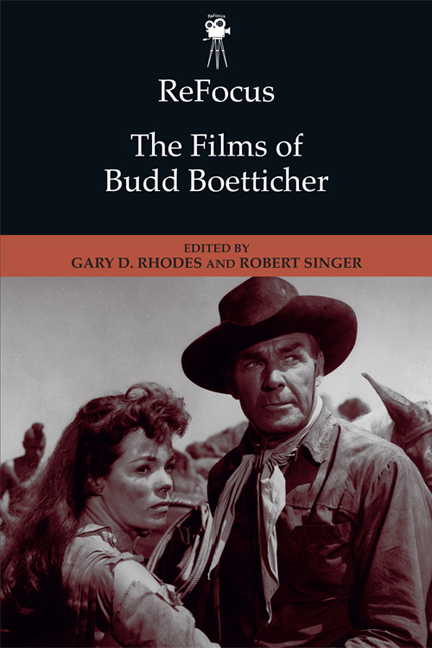Introduction
Published online by Cambridge University Press: 22 December 2017
Summary
“What happened up there?” — Ben Stride (Randolph Scott)
“Payte Bodeen. I killed him.” — Bill Masters (Lee Marvin)
“Why?” — Stride
“Why not?” — Masters
Seven Men From Now (1956)Few filmmakers have lived lives that have been as cinematic as Budd Boetticher's. He was himself aware of the fact, so much so that, during his later years, he wrote an autobiographical script.
Born in Chicago in 1916, Boetticher was an adopted child, one raised in a very unhappy household in Indiana. While in Mexico as a young man, Boetticher became entranced with bullfighting. His knowledge of the subject landed him his first break in Hollywood: technical advisor on Rouben Mamoulian's Blood and Sand in 1941. A directorial career followed, though it was largely undistinguished until 1951. Thanks to the efforts of John Wayne, Boetticher returned to the subject of bullfighting in his breakthrough film, Bullfighter and the Lady (1951) with Robert Stack. It was also the first film in which he was credited as “Budd Boetticher,” rather than his real name, Oscar Boetticher, Jr.
From there, Boetticher directed an array of films and television programs, most notably the “Ranown” series of Westerns starring Randolph Scott, the moniker resulting from the name of a production company Scott owned with producer Harry Joe Brown. Bucking the Hollywood system, he spent much of the 1960s in Mexico making a documentary film about bullfighter Carlos Arruza. The nomadic director spent years obsessively pursuing his subject, declining offers from Hollywood even though the project was fraught with problems. As a result, Boetticher suffered illness, divorce, bankruptcy, and even incarceration in jail and in an asylum. He gave no indication, however, that he would have changed his life even if had he been able. As Dr Storrow (John Archer) asks Sam (Noah Beery, Jr.) in Boetticher's Decision at Sundown (1957), “What man knows how a life should really be lived?”
Despite the many personal troubles he faced, Boetticher's films—particularly the Ranown Westerns—have been extremely influential, his adherents ranging from Sergio Leone and Sam Peckinpah to Martin Scorsese and Anthony Sarris. Such acclaim has resulted in numerous retrospectives and restorations, as in the Bruce Ricker documentary Budd Boetticher: A Man Can Do That (2005) and Sony's DVD boxed set The Films of Budd Boetticher (2008).
- Type
- Chapter
- Information
- ReFocus: The Films of Budd Boetticher , pp. 1 - 10Publisher: Edinburgh University PressPrint publication year: 2017



